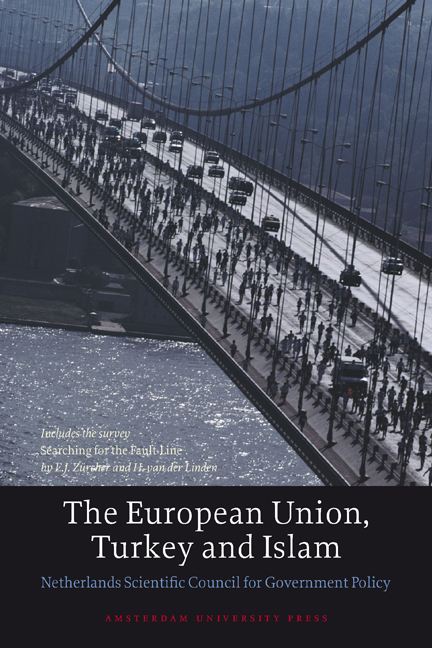Book contents
- Frontmatter
- Contents
- Summary
- Preface
- 1 Introduction
- 2 The European Union and Religion
- 3 Turkish Islam and the European Union
- 4 Conclusions
- Epilogue
- Literature
- Searching for the Fault-Line
- 5 Introduction: Turkey – Fault-Line, Frontline or Test Case?
- 6 Turkey’S Current Islamic Landscape
- 7 Turkish Islam and the Eu: a Clash of Civilisations?
- 8 Conclusion: Turkish Islam and European Civilisation
- Literature
- Websites
7 - Turkish Islam and the Eu: a Clash of Civilisations?
Published online by Cambridge University Press: 14 January 2021
- Frontmatter
- Contents
- Summary
- Preface
- 1 Introduction
- 2 The European Union and Religion
- 3 Turkish Islam and the European Union
- 4 Conclusions
- Epilogue
- Literature
- Searching for the Fault-Line
- 5 Introduction: Turkey – Fault-Line, Frontline or Test Case?
- 6 Turkey’S Current Islamic Landscape
- 7 Turkish Islam and the Eu: a Clash of Civilisations?
- 8 Conclusion: Turkish Islam and European Civilisation
- Literature
- Websites
Summary
In the previous part of this survey, we have made acquaintance with several important characteristics of Turkish Islam, and also with the large variety of Turkey's religious landscape. In this chapter, we wish to answer the question to what extent the fact that Turkey is an Islamic country will turn out to be an insurmountable impediment to its membership of the EU. In other words: does Islam block Turkey's accession to the EU? The discussion takes place against the wider backdrop of yet another debate, i.e. on the place in this landscape of Samuel Huntington's notion of the ‘clash of civilisations’. Implicitly, therefore, this leads us to an assessment of the validity of his paradigm, which has been widely used since its launch in 1993, especially in politics and journalism.
MODERN VERSUS WESTERN
Characteristic of Huntington's approach (apart from his dividing of the world into ‘civilisations’), is his distinction between the West and modernity, or put differently: between Westernisation and modernisation. Since the 18th century, all modernisation processes (which include elements such as industrialisation, urbanisation, literacy, education, prosperity, labour specialisation and social mobilisation), have their roots in European civilisation, which was the first to modernise. In principle, modernisation is a revolutionary process that is universal. Nations such as Japan and China prove that countries from different civilisations can also undergo a successful modernisation process. According to Huntington, this does not mean that Western culture will therefore also becomes a universal culture. He emphatically discards the notion that ‘modern’ and ‘Western’ are identical. With the ‘clash of civilisations’ he no longer believes (as he once did) that advancing modernisation will allow values that are characteristic of Western civilisation to become universal. His explanation for this is that Western civilisation was formed in the era preceding the start of the process of modernisation of the 17th and 18th centuries. The West was already the West before it became modern. Other areas of the world take part in this modernisation process, without possessing the cultural legacy of the premodern West (Huntington 2002: 68-72).
- Type
- Chapter
- Information
- The European Union, Turkey and Islam , pp. 147 - 168Publisher: Amsterdam University PressPrint publication year: 2004



